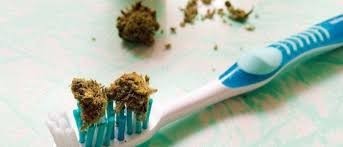
As more individual states legalize marijuana each year, we need to discuss the impact of marijuana on our oral health. That’s not to say that this is a new phenomenon—people have been partaking of pot, weed, or Maryjane as you may hear it colloquially called since it was first discovered by the Neolithics some 10,000 years ago. However, since it is has gone from taboo to legal in some states, the oral health implications of the herb need to be explored.
What is Medical Marijuana?
Derived from the cannabis plant, marijuana is made primarily of THC, the euphoric part of the herb, and CBD, the analgesic part most used for pain relief. While also used recreationally legally and illegally all over the world, the use of medical marijuana (specialized marijuana prescribed by doctors for patients with specific health concerns that could be helped by the drug) has increased. Some of the many disease states and illnesses it is used for include cancer, respiratory issues, AIDS, some mental disorders, abdominal cramping, and glaucoma.
In the United States, some states have opted to legalize marijuana either for recreational or medical use. Those with a medical marijuana card can access medical-grade marijuana as regulated by their state. Currently, 29 states have legalized medical marijuana.
Oral Health Statistics for The Cannabis User
According to research from CM Cho in the Australian Dental Journal, regular cannabis users generally have poorer oral health than non-users. This includes higher instances of cavities, decay, missing and filled teeth, higher plaque scores, and less healthy gingiva. However, this is complicated by associated factors such as high tobacco, alcohol, and other drug use.
Cannabis users also have increased risk of developing oral leukemia, oral cancer, oral candidiasis, and other oral infections, as well as periodontal complications, and mouth and neck cancers. If a patient smokes traditional tobacco in addition to medical marijuana, several risk factors are compounded.
Not unusually, cannabis use leads many people to eat snack foods not historically good for teeth. This, paired with lack of oral hygiene will high, is also a contributor to decreased oral health. As it turns out, “the munchies” are not just bad for the waistline!
Cannabis and Dental Care: The Conversations Dentists Need to Have with Patients
A patient that comes in for an appointment “high” presents several risks for a dental practitioner. As many patients naturally feel nervous at appointments, they may decide to get high to “take the edge off” (studies show the opposite to be true). This is the singular reason it’s important for all dentists to have a conversation with patients about the risks of coming to an appointment after partaking in marijuana.
Patients under the influence open themselves and their dental team up to several issues. Studies show increased anxiety, paranoia, and hyperactivity increasing stress during the visit. Cannabis can increase heart rate and other cardio-respiratory effects which can make the use of epinephrine potentially fatal. It's important to assess all patients closely before treatment for their health and safety and also for validity of informed consent.
Optimal Oral Health Tips for Cannabis Users
Cannabis users should remember that cannabis, whether inhaled or eaten, affects oral health in the same way cigarettes, alcohol, or candy does. It’s important to stay vigilant regarding oral hygiene and maintenance to live the best, healthiest life. Here are a few tips for ultimate oral health.
As more states legalize the use of marijuana, the medical community needs to have conversations with patients about cannabis use and risks. Setting expectations of service, such as not performing procedures on patients under the influence at the time of their appointment and providing helpful tips for care will help patients live their healthiest lives. Cannabis is part of the national conversation; be sure it’s part of yours with your patients.